Cold War
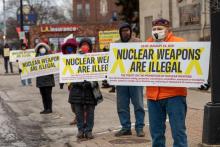
President Vladimir Putin’s announcement on Sunday that he had ordered Russian nuclear forces to high alert (he called it a “special mode of combat duty”) brought to mind some of the most dangerous days of Cold War brinkmanship. For four decades, bellicose Soviet and American rhetoric and actions — from the Cuban missile crisis to Reagan administration talk of a “winnable” nuclear war — kept the world at very real risk of annhilation. (The Biden administration, to its credit, responded this week to Putin’s provocations by asserting, correctly, that “A nuclear war cannot be won, and must never be fought,” as a White House offical put it to Reuters, and declined to escalate the U.S. nuclear alert status.)
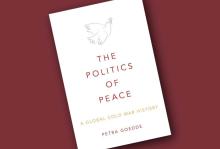
THE U.S. HAS BEEN on a war footing since at least 1939. Undergraduate students today have never known a world before 9/11, and even their instructors (I was born in 1983) have never known a peaceful America. The Cold War era that preceded our own was enormously bloody in places such as Lebanon, Vietnam, and Afghanistan—and in all these countries, American intervention played a role.
During the Cold War, permanent war footing seemed like more of a threatening novelty than a grinding inevitability. The time played host, therefore, to a global and surprisingly influential peace movement. The Politics of Peace tells the movement’s dramatic story of both ideals co-opted and maybe even betrayed and ideals that shaped our world and might be worth recovering.
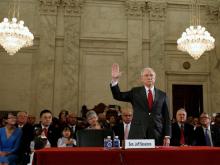
Senator Jeff Sessions of Alabama recently raised eyebrows during his confirmation hearing for attorney general when he expressed doubts that secular people respected the truth as much as did those with religious convictions. Even as he insisted that there should be no religious tests for holding public office, Sessions was queasy about the potential dangers of the secular worldview.

Ten days before Donald Trump's inauguration, the former mayor of Hiroshima sent the president-elect a letter calling on the incoming U.S. administration to lead on nuclear non-use in Northeast Asia.
"Keenly aware that your decisions on matters related to nuclear weapons will affect everybody in the world and especially those of us living in Hiroshima, we, Hiroshima citizens and hibakusha (A-bomb survivors), expect these decisions to be wise and peaceable," Tadatoshi Akiba, Hiroshima's former mayor, wrote.

Republican South Carolina Gov. Nikki Haley will be a rare woman on Donald Trump’s Cabinet-level team, and one of the few persons of color.
Knowing little about her foreign policy positions, given that she has little to no international experience, what should we expect from Haley once she is confirmed to be ambassador to the United Nations?
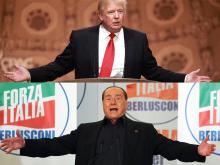
Donald Trump’s victory in the 2016 presidential election has few parallels in the history of contemporary politics in the Western world.
But the closest one is familiar to me: Silvio Berlusconi, the media tycoon who was elected prime minister of Italy — my homeland — for the first time on March 27, 1994 and who served four stints as prime minister until 2011.
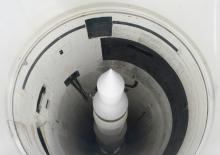
In the historic port city of Yalta, located on the Crimean Peninsula, I visited the site where Churchill, Roosevelt, and Stalin, in February of 1945, concluded negotiations ending World War II.
These leaders and their top advisers were also present at the creation of the United Nations and other instruments of international negotiation and non-military cooperation. Tragically, the creation of the “Cold War” was underway soon after.

When Ronald Reagan and Mikhail Gorbachev met in what has been seen as the beginning of the end of the Cold War, the venue was an unassuming house overlooking the sea in Reykjavík, Iceland. Höfði House had been previously occupied by the poet Einar Benediktsson, who once wrote, “Take notice of the past if you would achieve originality.” Whatever else Einar meant, at this house, the necessity of learning from history can’t be ignored.
It is easier to imagine today’s enemies talking once you’ve seen the house. You see, it’s not the Avengers’ home base or one of those underground lairs favored by James Bond villains. It’s just a house, surrounded by the typical trappings of a small city—business headquarters, cafes, supermarkets. The Icelandic government uses it today for social gatherings. And what happened in it 30 years ago was at heart two people communicating, with a shared goal that transcended them both.
The notion of enemies sitting down and talking with each other is also at the heart of the magnificent new Icelandic film Rams, which I saw in a cinema about five minutes’ walk from Höfði. Two sheep-farming brothers live and work beside each other, but haven’t spoken for four decades. A family shadow has driven them apart—one of those decisions made by parents seeking the best for their children but not knowing how to arrive there. And so, separately, the brothers endure twice the hardships and experience only half the blessings of life amid this most exquisite landscape. Success is ignored by the other, or serves as an occasion for jealousy rather than celebration; Christmas is spent alone, no one to share the feast, and Icelandic winters are hardest of all.

President Reagan was not the Evil Emperor — even for progressives. He granted amnesty to millions of undocumented immigrants, vocally supported federal gun control, and would probably be written off as a RINO by today’s conservatives for backtracking on his own tax cuts.
And while more flexibility on these issues among the Republicans of today would be commendable and a relief, I think Nov. 19 is the perfect day for the ghost of the Gipper to come haunt his party on an entirely different issue.
That’s because exactly thirty years ago today, on Nov. 19, 1985, President Reagan arrived in Geneva, Switzerland to meet with Mikhail Gorbachev, the leader of the Soviet Union, face-to-face. The event was carefully planned and statements meticulously edited for the press and the television cameras. It was the first time in six years that the leaders of the world’s two superpowers had met in person. Huge obstacles loomed between the two leaders. With the Soviet occupation of Afghanistan, the arms race, and Reagan's “Star Wars” missile defense program all causing tension, was it even worthwhile to meet?
AMID WORRIES about a new Cold War, of standoffs with old enemies and confrontations with new ones, Harvard professor Elaine Scarry’s latest book is a chilling reminder of the doom our presidentially controlled nuclear arsenal can unleash upon the world. Early on, she reminds us that President Nixon told reporters, “I can get on the telephone and in 25 minutes 70 million people will be dead.”
This boast illustrates Scarry’s thesis: We live in a thermonuclear monarchy, where one person—the U.S. president—can destroy the world. Nuclear doom is an accident waiting to happen, and she reviews a number of barely publicized near misses.
But she sees a solution at hand—the U.S. Constitution, specifically both Article I, Section 8, which says that Congress alone can declare war, and the Second Amendment. The text of the latter reads: “A well regulated militia being necessary to the security of a free state, the right of the people to keep and bear arms shall not be infringed.” (Emphasis added.) Scarry argues that the amendment mandates a second level of citizen consent to war, a further brake to executive power, even after Congress has given its approval—that the writers of the Constitution intended that before the U.S. engaged in any war the people would have to consent to join a militia, a form of collective participation in the decision for war. According to Scarry, our out-of-ratio nuclear weapons stockpile, ready to launch at the command of a single person, has negated the Constitution-mandated chain of accountability and decision-making and is therefore illegal.

NOVEMBER MARKS the 50th anniversary of the assassination of our 35th president, an event that defined the life of the baby-boomers—a generation that, by sheer force of numbers, still sucks up most of the oxygen in U.S. culture. There are new books, reissued books, documentaries, made-for-TV movies, and a new Hollywood production, Parkland, starring that Everyman of the baby boom, Tom Hanks. But, anniversary hoopla aside, the JFK assassination and its aftermath can also provide us with some very timely lessons about the dangers that come with secret wars and unaccountable power.
Fifty-nine percent of Americans don’t believe the official story that Lee Harvey Oswald alone killed President John F. Kennedy, and this time the majority is right. The available evidence strongly suggests that the president was the victim of a murder plot that involved anti-Castro Cubans, enraged by his failure to back them up during the Bay of Pigs invasion, and their allies in organized crime who had been heavily invested in pre-Castro Havana. That was the conclusion of the House Select Committee on Assassinations in 1978, which also found physical evidence of another shooter at the crime scene.
Of course, the armed anti-Castro forces in Florida were a bought-and-paid-for creation of our CIA, and the CIA was also working with organized crime figures in various plots to assassinate Castro. So it’s no great leap to suspect some complicity in Kennedy’s assassination by CIA employees. Some reasonable people, including peace activist and theologian James W. Douglass in his book JFK and the Unspeakable, have gone further, claiming that the Kennedy assassination was the result of a policy decision, taken at the very highest levels of the national security state, aimed at heading off JFK’s plans to pull out of Vietnam and end the Cold War. This theory relies heavily on National Security Action Memorandum 263, which laid out plans to begin withdrawing troops from Vietnam, and journalist Norman Cousins’ account of back channel diplomacy in the book, The Improbable Triumvirate: John F. Kennedy, Pope John, Nikita Khrushchev.
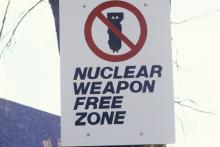
HOW MANY NUCLEAR weapons make us "safe"?
At the height of the Cold War, both the U.S. and the Soviet Union had tens of thousands of nuclear warheads, aimed at each other's cities, towns, and military targets. Not many felt that the world was somehow made safe by this hair-trigger, apocalypse-risking standoff.
The Soviet Union is long gone, but the Cold War mentality that fueled the era's nuclear arms race seems to linger on. According to a December report by the Federation of American Scientists, the world's combined stockpile of nuclear warheads is still more than 17,000. Of these, the report continues, "some 4,300 warheads are considered operational, of which about 1,800 U.S. and Russian warheads are on high alert, ready for use on short notice."
President Obama, for his part, has laid out what he called his "vision of a world without nuclear weapons." In a speech last March in Seoul, South Korea, Obama said the goal of a nuclear-free world "would not be reached quickly, perhaps not in my lifetime," but that it must begin "with concrete steps." He continued, the "massive nuclear arsenal we inherited from the Cold War is poorly suited for today's threats," and "we can already say with confidence that we have more nuclear weapons than we need." (That could be considered a gross understatement, since the next leading nuclear threat—China—has only about 50 warheads on ICBMs that could reach the U.S.)
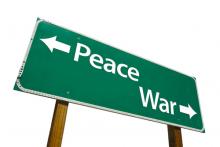
IN THE U.S., the Cold War has served to justify a permanent wartime economy, blacklisting and surveillance of dissenters, and military interventions against smaller and weaker nations from Vietnam to Nicaragua. In the Soviet Union, it has been used to excuse a permanent state of economic austerity, the imprisonment and torture of dissenters, and military interventions from Hungary to Afghanistan. And on both sides the Cold War has provided the ideological underpinning and political momentum for a nuclear arms race that threatens the future of the entire human family. ...
As Christians our faith, security, and hope for a peaceful world can only be placed in the one true God, who is the creator and sustainer of all life and the Lord of history. The first and most essential commandment forbids us to trust the fate of God’s earth and generations unborn to the creations of finite, fallible, and fallen human beings.
From the fall of the Berlin Wall in November 1989 to the dissolution of the Soviet Union in December 1991, the Cold War ended. But U.S. policymakers apparently still haven’t gotten the news.
This meeting of the Summit of the Americas in Cartagena, Colombia, last weekend ended without the usual official declaration because U.S. policy refuses to include Cuba, while a broad range of other governments in the Americas supports an invitation. The final vote was 32-2 for Cuba’s inclusion in future meetings, with only the U.S. and Canada opposed.
Reuters noted: “U.S. insistence that Havana undertake democratic reforms before returning to the hemispheric family led to a clash with a united front of leftist and conservative governments that see Washington's policy toward Cuba as a relic of the Cold War.”
It’s long past time for the U.S. to realize that the Cold War is over, that Cuba exists, and that inclusion will foster change faster than exclusion. Even the Vatican realizes that, as Pope Benedict’s recent trip to Cuba demonstrated.
I am one of those who still prefer ink on paper to pixels on a screen. But no matter how you get your news, the passing of a giant is worth noting. Tom Wicker, reporter and columnist for The New York Times for 30 years, died on Saturday. The Times described him as “one of postwar America’s most distinguished journalists.”
Wicker was a meticulous reporter and a passionate advocate, so much so that he was sometimes criticized for overstepping the bounds of objectivity. But when faced with the major events he wrote on, how could he not be?
Albania was perhaps the most closed society in the world during the Cold War, with absolutely ruthless persecution of all religion. Churches were destroyed in every corner of that country. Clergy were eliminated. Worship was outlawed. And enforcement was brutal.
When Communism fell, and the country opened for the first time in decades, the Albanian church began a miraculous process of rebirth. We heard the moving story of the Albania Orthodox Church, rebuilding countless church structures, but even more importantly, restoring faith in the hearts of its people. I've known its leader, Archbishop Anastasios, from past encounters at the World Council of Churches, and he surely is a saint. The revival of religious faith in Albania and its compassionate service to those in need is a magnificent story of the church's witness, and the Spirit's power.
How strange sightings, the Cold War, and the national security state add up to a truth we'll never know.